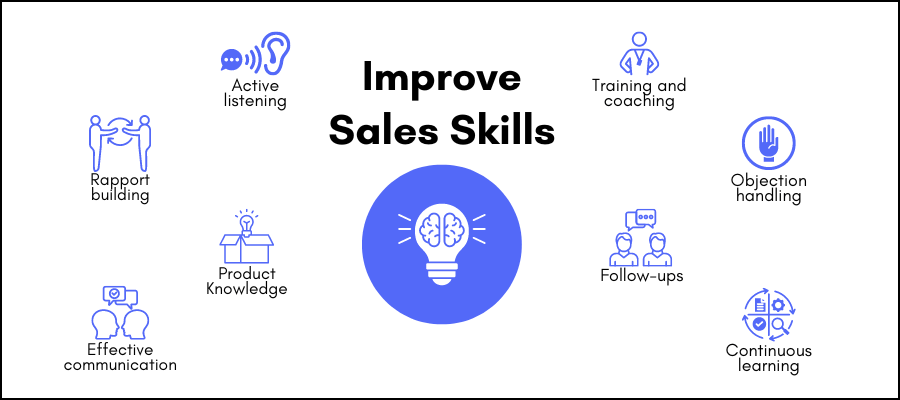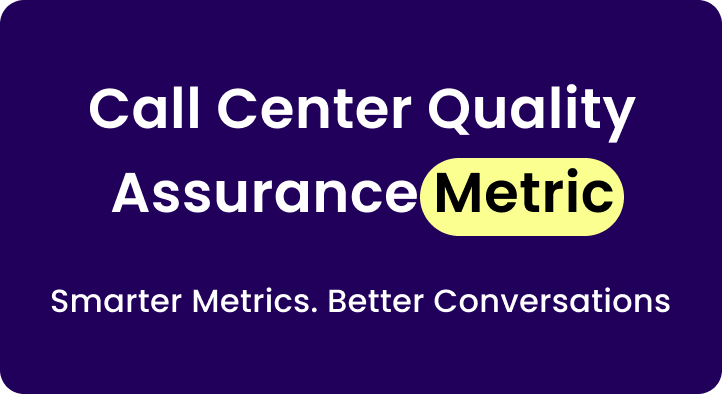Sales skills are the core competencies that separate top performers from average reps. Whether you’re selling enterprise software, B2B services, or consultative solutions, mastering these 19 skills, from active listening and discovery to objection handling and closing, is essential to consistently exceed targets.
This guide breaks down each skill, explains why it matters, and provides actionable tips to develop it.
You’ll learn which skills have the highest impact on revenue, how to assess your current skill level, and how to create a development plan that turns good reps into great ones.
Table of Contents
A. What are sales skills?
Sales skills encompass the abilities, knowledge, and techniques needed to effectively persuade potential customers to purchase a product or service.
These skills include:
- Effective communication
- Active listening
- Empathy
- Problem-solving
- Social selling
- A deep understanding of the product or service and the customer’s needs.
Sales skills also involve the ability to build relationships with customers, overcome objections, negotiate effectively, and close deals.
Salespeople must demonstrate resilience and maintain a positive attitude. They also need to function effectively under pressure and achieve sales targets.
Overall, strong sales skills are crucial for anyone who wants to be successful in a sales role.
B. Top 19 sales skills every salesperson must master
1. Buyer research
To close more deals, reach out to prospects who are likely to become clients.
But for that, you need to do research. You need to find out about the types of buyers, the competition, market trends, and other important business facts.
All this data will help you reach the right prospects and close more deals.
2. Customer service
Great customer service skills involve quickly understanding and addressing customer needs and issues.
Being kind, helpful, and empathic creates a great customer experience at every touchpoint.
Salespeople can build loyalty and trust by answering questions, solving problems, and exceeding customer expectations.
3. Communication
Good communication with prospects and clients is a key sales skill.
Because the way you say it matters more than what you say.
To be a great salesperson, you need strong skills in both oral and written communication. This includes presentations, phone calls, and pitches for oral skills. For written skills, focus on emails, social media, proposals, and memos.
Another thing that you need to focus on is that you talk the same way your prospect is talking. For example, if he is speaking formally, do the same.
It helps you to create rapport with the prospect and have a positive impact on how he perceives your brand.
To boost your communication skills, try conversation intelligence software like Enthu. It analyzes your calls and shows you where you can improve.
4. Product knowledge
If you don’t know about the product that you are going to sell, how will you sell it?
Every sales rep must know the product inside out, i.e., the features, benefits, weaknesses, etc.
Understanding the product helps sales reps answer prospects’ questions. It also allows them to offer tailored solutions based on specific needs.

This sales skill is essential for a strong sales pitch and better sales results.
Problem-solving skills are key. They help find, assess, and tackle issues that arise in sales. This means using both critical and creative thinking. We find solutions that satisfy customer needs and match the company’s goals. Good problem solvers spot and fix issues before they happen. This keeps transactions smooth and customers happy. You need to find and add prospects to the sales funnel. Then, qualify them to see if they are ideal customers for your product. Prospecting is a crucial step because this is the start of your sales process. It means if you are not finding leads that can be your ideal customers, you are delaying your entire sales process. If you master prospecting, you’ll do less work during qualification. So, strategic prospecting boosts sales and helps you reach your targets. If you want to succeed in sales, then you need to listen more and talk less. Active listening is about paying attention to the buyer’s needs and concerns. It requires listening fully and not interrupting with follow-up questions. When you give time to prospects to speak, they will automatically share all the pain points they are facing. So, whether you are in face-to-face conversation or cold calling, you need to let prospects complete first and then speak. Following up means staying in touch with prospects and customers. This helps build connections and boost sales. This includes a personal touch to confirm interest, provide more details, and address any worries. Regular follow-up shows that you are reliable and committed. This helps close sales and build lasting relationships. Every prospect who is interested in your product will have objections against your products. So, every sales rep must know how to handle sales objections. You can use this opportunity to ask more questions to the prospect that can help you understand the needs of the individual more clearly. Sales reps must be well-prepared in advance to handle such sales objections. The one thing that you can practice in advance and be confident about in a sales process is your sales presentation and demo skills. Mastering demo skills is necessary because it shows that you know your product and builds trust around your brand. Building relationships involves building and maintaining strong, trustworthy connections with customers and stakeholders. This skill includes active listening, understanding, and true care for the customer’s needs and goals. Building great relationships encourages recurring business, recommendations, and a positive market reputation. A great sales rep is the one who makes the prospect commit to a deal quickly. But it is only possible if you are talking to a decision-maker. So, you must bring the decision-maker into the sales process soon. To make a prospect commit to a deal, you must make him understand the value of your product and how it can help you. Representatives might be tempted to focus only on their targets, however, sales is a team effort, and teamwork is crucial for creating a smooth sales process. A rep may need to work with their marketing team for a smooth hand-off in sales. Or, they might focus on collaborating with a prospect to reach a win-win agreement. Once you gain the confidence of the decision-maker, it is time to close the deal. For that, sales reps must know all about the different sales closing techniques. Learning how to close a deal is necessary because it defines all the hard work that you have put into the previous steps of the sales process. Sales reps should practice these closing techniques a lot if they want to close the deals effectively and efficiently. Negotiation abilities are necessary for mutually beneficial deals with customers. This means knowing what the customer needs. It also involves sharing the value we provide and finding shared interests. Skilled negotiators find a balance between being firm and sensitive. They aim for win-win situations. This approach improves customer relationships and increases sales success Closing a sale is a good thing. But it becomes better when your product provides real value to the prospect. So you should be buyer-centric. You must understand the pain points of the prospects and provide them with a solution as per their needs. Developing empathy for prospects is one of the sales skills that a salesperson should have. And what better way to showcase than using empathy statements? Sales reps must have a goal in sight and the determination to achieve it. Setting goals is essential because it provides you with a destination that you have to reach. So, sales reps must be goal-oriented. And if they are not, then sales leaders must help them to become goal-oriented. Sales personnel with data analysis skills can analyze and use data to inform their plans and decisions. This means looking at how consumers act, what trends are in the market, and how sales are doing. We want to find ways to improve. Good data analysis helps find the best prospects. It also streamlines sales processes and predicts future sales. Sales reps must know when they are wrong and should take full responsibility for the mistake. They should never make excuses or pin-point the mistake on someone else. Taking responsibility is what makes you a great salesperson. Experts in the field of sales have highlighted the importance of honing sales skills to be successful in the profession. Here are a few insights from experts: In other words, sales skills are not just about closing the deal, but also about effectively managing the sales process from beginning to end. He says that sales skills such as empathy, active listening, and building rapport are critical for establishing trust with customers, which in turn leads to better sales outcomes. Overall, experts agree that sales skills are a crucial component of success in sales. Effective salespeople must be able to build relationships, understand customer needs, communicate effectively, and manage the sales process from start to finish. 1. Active listening: Concentrate on fully understanding your customer’s requirements and needs. Listen more than you speak, and ask questions to show actual interest and gain important data. 2. Rapport building: Find a common ground to build a connection and trust with your customers. To make the interaction more personal, use good body language, maintain eye contact, and engage in small conversation. 3. Product Knowledge: Develop a thorough understanding of your product or service, including its features, benefits, and USPs (unique selling points). Keep up with industry developments and competitors to deal with objections and deliver valuable insights to your customers. 4. Effective communication: Improve your verbal and nonverbal communication abilities to deliver your message effectively and clearly. Tailor your pitch to the specific wants and preferences of each customer, using language that resonates with them. 5. Training and coaching: Sales training and professional development options can help you keep your skills relevant. A lifelong learner has a competitive advantage in the game of sales. Seek feedback from peers and mentors, and periodically assess your performance to find areas for development. 6. Objection handling: During your sales calls, you will face objections and queries regarding your product or service. That’s why it’s critical to be as prepared as possible for objections and have prefabricated responses available. Instead of viewing complaints as defeats, consider their chances to share more information and explain misunderstandings. 7. Follow-ups: Maintain continuous prompt follow-up with potential and existing customers. Personalize your follow-up emails and messages to demonstrate your interest and keep the conversation going. 8. Continuous learning: Maximize productivity by prioritizing activities and prospects. Use CRM software to keep track of conversations, plan follow-ups, and ensure no lead falls through the cracks. Sales is a very competitive field. You have to be focused and give your best shot every time. Because if you miss your target, then there is always someone out there to grab the opportunity. Even within the organization, you have to compete as teams or individuals. So, you need to develop(and possess) the required sales skills if you want to succeed in this competitive world. 1. What is the most important skill in sales? Effective communication – is a critical skill in sales as it enables sales professionals to understand customer needs, build rapport, articulate value, and ultimately close deals. It involves active listening, empathy, and clear, concise language. 2. What 5 things are important in sales? Effective communication b) Active listening c) Empathy d) Product knowledge e) Relationship building These are key elements for sales success, along with setting targets, time management, and problem-solving skills. 3. What are hard skills in sales? Hard skills in sales include product knowledge, market research, CRM management, sales analysis, and proficiency in sales technologies. These technical skills are necessary for effective selling and meeting sales targets. 5. Problem solving
6. Strategic prospecting

7. Active listening

8. Following-up
9. Objection handling
10. Demo skills
11. Relationship building
12. Gaining commitment

13. Collaboration and teamwork
14. Closing techniques

15. Negotiating
16. Empathetic
17. Goal oriented

18. Data analysis
19. Responsible
C. What do experts say?
D. How to improve sales skills?

Conclusion
FAQs



 On this page
On this page

